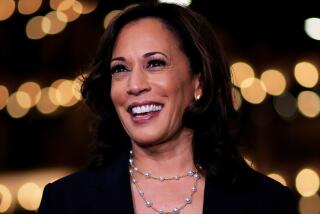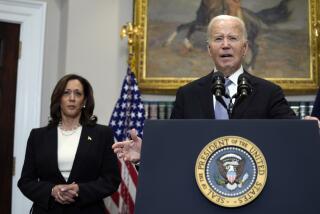POLITICS : Clinton Calls for Two Heads to Run His Troubled Party : Dual leadership is settled on as a way to improve Democrats’ chances. Communication, administration roles would be split.
- Share via
WASHINGTON — For a President, choosing the head of his party’s national committee is usually little more than a routine matter. But not for President Clinton after the Democratic debacle in the November elections.
Striving to boost Democratic comeback chances, Clinton now intends to put the chairmanship of the party’s national committee, which throughout its history has been a one-man job, under dual control. If all works out according to Clinton’s script, Connecticut Sen. Christopher J. Dodd will be cast as the chief Democratic Party spokesman, while longtime South Carolina political operative Don Fowler will fill the role of day-to-day manager.
Details of the novel arrangement remain to be resolved. But White House officials hope to introduce their new team later this week.
The split-level arrangement stems from the varying views held by Democratic leaders and by Clinton of the reasons for the November balloting, which gave Republicans command of both houses of Congress for the first time in 40 years.
Many Democrats put part of the blame on Clinton’s handpicked national chairman, David Wilhelm, who quit after the election. He was accused of being ineffective and more concerned with serving the White House than Democratic members of Congress and state and local candidates.
Clinton told California State Party Chairman Bill Press in an election post-mortem that he felt the national committee was preoccupied with organization and had not given enough attention to communicating with the voters during the first two years of Clinton’s tenure.
Clinton settled on Dodd, according to White House and party sources, because he considered him best able to lead the rhetorical charge against the Republicans during the next two years. In the process, the White House hopes that Dodd will boost the morale of local party officials and candidates and help project Clinton’s message to an electorate that will decide next year whether to renew his lease on the Oval Office.
Dodd, 50, who has served in the Senate since 1980, apparently owes his new post in large measure to a campaign he lost--the contest for Democratic Senate leader in which he was bested by South Dakota Sen. Tom Daschle. Despite his defeat, Dodd’s vigor and intelligence impressed many Democrats--including Clinton and his political advisers.
Michael Barnes, Democratic national committeeman from Maryland and a former House colleague of Dodd’s, said: “He is very quick, very bright, extremely articulate and effective on television.”
In addition, the White House hopes Dodd’s personal popularity on Capitol Hill will help repair Clinton’s strained relations with Democratic lawmakers, some of whom blame him for their unaccustomed role in the minority.
But Dodd’s resume for national chairman had one glaring shortcoming. He already has a job--working for the people of Connecticut. The White House believes it has found the solution to that problem in Fowler, a veteran of more than 20 years on the national committee, who seems to many to be perfectly cut out for actually running it.
“He is an insider’s insider,” Barnes said. In addition, Democrats hope that as a Southern moderate, Fowler will provide some ideological balance for Dodd, a Northeastern liberal.
But not everyone is convinced. Fowler, for one, is said to want reassurance that he will have enough freedom and authority to do the job before he signs on. And some of the state party leaders are worried that the new arrangement might not work out.
Defenders of the White House plan point to the success of a similar arrangement installed at the Republican National Committee in 1983 after a shattering Republican defeat in the 1982 midterm elections. Then-Nevada Sen. Paul Laxalt served as general chairman of the party and Frank Fahrenkopf ran the national committee as chairman. President Ronald Reagan won reelection by a landslide in 1984.
But Fahrenkopf claims the two situations are really not that similar. Laxalt’s main responsibility, he points out, was not to serve as party spokesman but to coordinate the national committee’s efforts with the work of the GOP Senate and House campaign committees. Moreover, Laxalt was one of Reagan’s closest friends and Fahrenkopf and Laxalt were longtime allies in Nevada politics.
More to Read
Get the L.A. Times Politics newsletter
Deeply reported insights into legislation, politics and policy from Sacramento, Washington and beyond. In your inbox three times per week.
You may occasionally receive promotional content from the Los Angeles Times.










